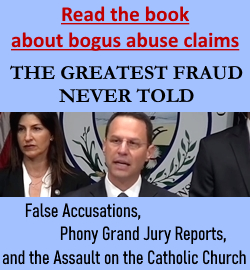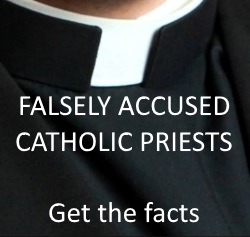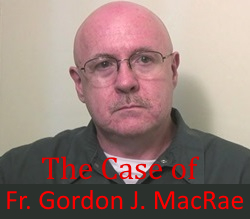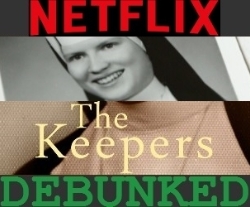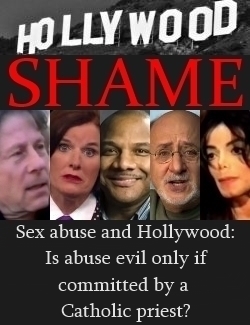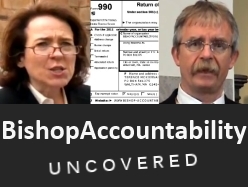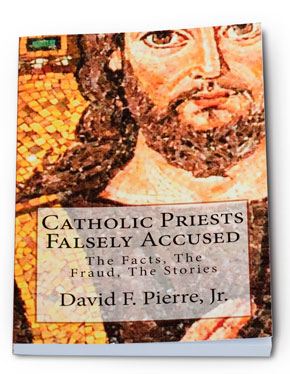William Lobdell's new book Losing My Religion: How I Lost My Faith Reporting on Religion in America-and Found Unexpected Peace is nothing original. A former "serious Christian" loses his faith because he finds a "disturbing gap between the tenets of various religions and the behaviors of the faithful and their leaders." Ugh.
For what it's worth, the unoriginality will not harm Lobdell, however. Liberals, atheists, and the mainstream media will love this work. It will certainly garner tons of media attention. Any book by a former "serious Christian" that bashes organized religion, especially Catholicism, is practically guaranteed to be a hit with critics. (A full month before its release, there were already 28 four- and five-star reviews posted at Amazon.)
My critique:
I. Lobdell flat-out lies about what the Catholic Church teaches. On page 85 of his book, he asserts there's a "wonderful loophole" in Catholicism. Lobdell believes he can disregard Church teaching by applying "personal conscience." Lobdell falsely asserts that he can simply apply his "conscience" to disagree with the Church on birth control, transubstantiation, and any other issue that he does not agree with. In other words, through this "wonderful loophole" called "conscience," he has full license to be a "cafeteria Catholic."
WRONG. And not only is he completely wrong in this assertion, but Lobdell is especially dishonest when he quotes from paragraph 1790 of the Catechism. Here's what Lobdell quotes:
A human being must always obey the certain judgment of his conscience. If he were deliberately to act against it, he would condemn himself.
Yet here is the full context (Note the heading!):
IV. ERRONEOUS JUDGMENT
1790 A human being must always obey the certain judgment of his conscience. If he were deliberately to act against it, he would condemn himself. Yet it can happen that moral conscience remains in ignorance and makes erroneous judgments about acts to be performed or already committed.
The catechism continues:
1791 This ignorance can often be imputed to personal responsibility. This is the case when a man "takes little trouble to find out what is true and good, or when conscience is by degrees almost blinded through the habit of committing sin."59 In such cases, the person is culpable for the evil he commits.
1792 Ignorance of Christ and his Gospel, bad example given by others, enslavement to one's passions, assertion of a mistaken notion of autonomy of conscience, rejection of the Church's authority and her teaching, lack of conversion and of charity: these can be at the source of errors of judgment in moral conduct.
In other words, Lobdell quotes from a section of the Catechism that warns against the very errors he espouses! To be a "cafeteria Catholic" is to defy Church teaching. One cannot be a "cafeteria Catholic" and be a Catholic.
When the Church talks of "conscience," it means having an informed conscience. The Catechism clearly states that conscience is not autonomous. And it does not mean "feelings," as Lobdell appears to think it does.
Lobdell blatantly misrepresents Church teaching.
II. Although Lobdell claims he didn't abandon Christianity solely because of the immoral acts of believers, he spends a lot of the book on various episodes in which this very thing happened. Some thoughts on this:
a. Although he would claim otherwise, Lobdell seems oblivious to the fact that "Christian" doesn't mean "perfect," and it doesn't mean "unable to sin."
When Jesus walked in the flesh here on Earth, he could not have been more clear on a very important thing: His Church would be placed into the hands of sinners. For cryin' out loud, Jesus left his Church to a guy named Peter, even though he knew full well that Peter would deny him three times before his crucifixion! Peter was the first Pope, even with that awful act on his resumé!
And does the story of Judas ring a bell to Lobdell? (Note to Lobdell: Judas was one of the 12 apostles.)
Jesus came to Earth for sinners, not the righteous (Matthew 9:12-13; Mark 2:16-17; Luke 5:30-32). Does this truth justify or forgive the sins of Christians? Absolutely not, especially when it comes to the awful abuse of children. But it communicates to us something very important. When Christians sin – and they do, often, and very badly – we shouldn't be shocked or surprised. Jesus gave us a clear "heads-up" that sinners would permeate the Church. What we've had in recent years in the Church is a crisis of saints.
b. Catholics don't worship priests. We worship the three persons of the Trinity. Priests have been bestowed an important role in the function of the Church. Most notably, they administer sacraments. Although they are certainly expected to live to a higher standard than the laity (and 99% of them do), this does not make them immune from sinning. I guess Lobdell's RCIA class didn't explain this.
III. Lobdell spends an inordinate amount of time harping on the immoral actions of non-Catholics like Benny Hinn and those seen on TBN. Why? Lobdell was to become a member of the Catholic Church.
If anything, the wrongheaded and immoral beliefs and practices of non-Catholic Christianity only reinforce the unifying truth and authenticity of the Catholic Church. The Catechism spells this out, but Lobdell missed this one also.
IV. Lobdell believes God "hides" from us and has not given us guidance as to how we should live here on Earth.
Really? Yikes! Did Lobdell ever pick up and actually read the New Testament? Did Lobdell ever study the Catechism of the Church? How about watching a lecture by Fr. John Corapi? Or Peter Kreeft? Did he ever read C.S. Lewis? How about some writings of the Early Church Fathers?
Again – Lobdell's ignorance underscores how poor his RCIA may have been.
V. Lobdell articulates a laughable observation that there are "few differences between the morals of Christians and atheists." He claims, "It's hard to believe in God when it's impossible to tell the difference between His people and atheists."
Is Lobdell kidding? The Catholic Church, despite the faults of its members, remains the largest single charitable organization in the world – by far. (CNEWA, Catholic Relief Services, Catholic Charities, Catholic World Mission, CMMB, C-Fam, ICMC, Cross International Catholic Outreach, and the Bishop Gassis Fund are just some of the organizations I came up with at the top of my head just sitting here at the computer.)
When Lobdell hears the name "Cardinal Mahony," the first words that probably come to his mind are "abuse scandal." But to the thousands of poor that reside in Los Angeles County, Cardinal Mahony means food, clothing, and shelter.
In addition, countless studies show that religious people are far more charitable, happier, and optimistic than non-religious people. Lobdell is simply blind on this one. Only a warped conscience is unable to see the differences in morals between the Christian Mother Teresa and atheists like Josef Stalin, Pol Pot, and Jeffrey Dahmer. Can Lobdell – or anyone for that matter – name a single major charity organization driven by the tenets of atheism?
VI. Suffering. A difficult issue? Absolutely. An original issue/objection? Not even close. Again, do the names C.S. Lewis or Peter Kreeft ring a bell to Lobdell?
Lobdell never exhibits a real desire to seek out answers to this difficult issue. The closest he comes is attending a one-woman play by atheist Julia Sweeney. Yuck.
VII. Lobdell spends a lot of time on the awful abuse scandal of the Catholic Church. With that, let's look at the wise words of a Fr. Roger Landry, written at the peak of the Church scandal in 2002:
Jesus is with us, as he promised, until the end of time. He is still in the boat. Just as out of Judas’s betrayal he achieved the greatest victory in the universe—our salvation through his passion, death and resurrection—so out of this new scandal he may bring, wants to bring, a new rebirth of holiness, a new Acts of the Apostles for the twenty-first century, with each of us—and that includes you—playing a starring role. Now is the time for real men and women of the Church to stand up. Now is the time for saints. How will you respond?
So … How did Lobdell respond? Before the scandals broke, Lobdell faced a difficult marriage along with family and professional challenges. He prayed and begged for God's grace. Well, God blessed him with a happy family and a new job assignment.
Yet when the scandals broke, and the time came for "real men and women" to stand up, Lobdell bailed. He bailed on Jesus, and he bailed on His Church. How sad. How unfortunate.
The great Fr. John Corapi has said, "Christianity is not a wimp religion." Half of me sees Lobdell's actions as those of a wimp loser.
Yet the other half – the more rational side – simply realizes that Lobdell never understood his faith to begin with. He is woefully ignorant of the basic tenets of the Christian faith and what it means to be a Christian.
Finally … Lobdell's tale may very well illustrate the terrible cost of poor catechesis. There can be serious consequences when men and women are poorly instructed in the Catholic faith. Today's RCIA places way too much emphasis on "spiritual formation," when it should be exerting much more effort on doctrine and apologetics.
What are the arguments for God's existence? How can we be sure the New Testament documents are reliable? Why can't a Catholic support abortion? Why are homosexual acts immoral? Why can't women be priests? How does God reveal Himself to us in our everyday lives? Every RCIA program should address these questions. These are the questions that atheists and our secularist culture so often raise, and RCIA programs need to address these common questions. (By the way, if you call yourself a Catholic, and you cannot readily answer all of the above questions, seek the truth and get some help.)
I hope that Lobdell's RCIA instructor (an Orange County priest, the book tells) reads this book and realizes that he needs to seriously reinvent his program. The Church cannot have individuals going through RCIA and thinking it's permissible to be a "cafeteria Catholic." A "cafeteria Catholic" is not a Catholic.
+_+_+_+_+_+_+_+_+_+_+
A last tip: Save the unworthy $25.99 and just read Lobdell's lengthy 2007 article from the Los Angeles Times. The book is simply an "extended version" of his article.
